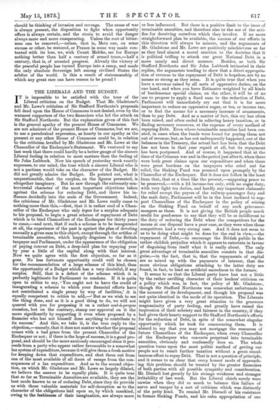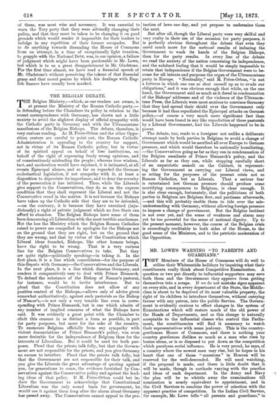THE LIBERALS AND THE BUDGET.
IT is impossible to be satisfied with the tone of the Liberal criticism on the Budget. That Mr. Gladstone's and Mr. Lowe's criticism of Sir Stafford Northcote's proposals fell dead upon the House of Commons is not denied, even by the warmest supporters of the two financiers who led the attack on Sir Stafford Northcote. But the explanation given of this fact is the general apathy of the present House of Commons. We are not admirers of the present House of Commons, but we are, to use a paradoxical expression, as hearty in our apathy as the present or any other House of Commons could be, in relation to the criticism levelled by Mr. Gladstone and Mr. Lowe at the Chancellor of the Exchequer's Statement. We ventured to say last week that there could hardly be a better gauge of the sincere Liberal feeling in relation to most matters than the feeling of Sir John Lubbock. Now his speech of yesterday week exactly expresses, to our mind, the tone which a sincere Liberal who is not a partisan would take on the character of the Budget. He did not greatly admire the Budget. He pointed out, what is unquestionable, that the surplus, on the figures presented, is altogether imaginary. But he saw through the extremely con- troversial character of the most important objections taken against the scheme for reducing Debt, and threw his in- fluence decidedly into the scale of the Government. Indeed, the criticisms of Mr. Gladstone and Mr. Lowe really came to nothing more than this,—first, that it is rather cool of a Chan- cellor of the Exchequer who only hopes for a surplus adequate to his proposal, to begin a great scheme of repayment of Debt which is to bind Chancellors of the Exchequer for thirty years to come,—and next, that if such a scheme is to be inaugurated at all, the experience of the past is against the plan of devoting annually a given sum to this object, except through the artifice of terminable annuities, which happily disguises to the British taxpayer and Parliament, under the appearance of the obligation of paying interest on Debt, a deep-laid plan for repaying year by year a little of the capital along with that interest. Now we quite agree with the fast objection, so far as it goes. No less fortunate opportunity could well be chosen for the recommendation of a large scheme of this kind, than the opportunity of a Budget which has a very doubtful, if any surplus. Still, that is a defect of the scheme which it is perfectly legitimate for Parliament to condone. If it is quite open to critics to say, You ought not to have the credit of inaugurating a scheme to which your financial efforts have not contributed a single penny by way of facilities,' it is equally competent to critics to add,—' But as we wish to see the thing done, and as it is a good thing to do, we will not quarrel with you for proposing it on a rather ntal-a-propos occasion, but on the contrary, stamp our approval on it the more significantly by supporting it even when proposed by a financier who has not himself done anything to contribute to its success.' And this, we take it, is the true reply to the objection,—namely, that it does not matter whether the proposal
comes with a bad grace from the present Chancellor of the Exchequer or not; if there is the hope of success, it is a good pro- posal, and should be the more anxiously encouraged since it pro- ceeds from a party who appear rather favourable to a somewhat lax system of expenditure, because it will give them a fresh motive for keeping down that expenditure, and shut them out from one of the most available of all doors of escape from the con- sequences of a lax expenditure. And as to the second objec- tion, on which Mr. Gladstone and Mr. Lowe so largely dilated, we believe the answer to be equally plain. It is quite true that so far as Terminable Annuities are available they are the
best mode known to us of reducing Debt, since they do provide us with those valuable materials for self-deception as to the character of the obligations laid upon us, by which mankind, owing to the feebleness of their imagination, are always more or less influenced. But there is a positive limit to the issue of terminable annuities, and therefore also to the use of the arti- fice for deceiving ourselves which they involve. If no more straightforward plan be available, the success of our efforts in this direction will always be minute, and the arguments of Mr. Gladstone and Mr. Lowe are positively mischievous so far as they lend almost a moral sanction to the doctrine that it is political trifling to attack our great National Debt in a more manly and direct manner. Besides, as both Sir Stafford Northcote and Sir John Lubbock intimated in their replies, the arguments tending to show that a direct appropria- tion of revenue to the repayment of Debt is hopeless, are by no means so strong as they seem. It is quite true that when you have a revenue raised by all sorts of oppressive duties, on the one hand, and when you have Estimates weighted by all kinds of burdensome special claims, on the other, it will be of no use to propose to apply a fixed sum to the reduction of Debt. Parliament will immediately cry out that it is far more important to reduce an oppressive sugar, or tea, or income tax, or to find the means for a necessary increase of armaments, than to pay Debt. And as a matter of fact, this cry has often been raised, and often ended in relieving heavy taxation, or in finding necessary resources, at the expense of every method of repaying Debt. Even where terminable annuities had been cre- ated, in cases when the funds were found for paying them not out of revenue, but, as has not unfrequently happened, out of the balances in the Treasury, the actual fact has been that the Debt has not been in that year repaid at all, but its repayment has been postponed. And of course, it happened that at the time of the Crimean war and in the period just after it, when there were both great claims upon our expenditure and when there were great burdens on the taxpayers who cried out for relief, the Sinking Fund was pounced upon promptly by the Chancellor of the Exchequer. But it does not follow in the least from that, that at a time like the present,—supposing peace to be preserved,—with a 2d. income-tax only, with no sugar duty, with very light tea duties, and hardly any important claimants for relief except the payers of the railway-passenger duty and the malt duty, Parliament will be in the least inclined to sup- port Chancellors of the Exchequer in the policy of seizing on the Sinking Fund on behalf of any such grievance- mongers as these. It is not giving the British people much credit for good-sense to say that they will be as indifferent to the duty of reducing the Debt when the competitors for the means at our disposal have a poor case, as they were when those competitors had a very strong case. And it does not seem to us to be doing what might be done for the end in view,—the repayment of Debt,—to encourage the British public in the rather childish prejudice which it appears to entertain in favour of disguising from itself what it is really about. The only great advantage of terminable annuities consists in that dis- guise,—in the fact, that is, that the repayments of capital are so mixed up with the payments of interest, that the more obvious obligations attaching to the latter duty are found, in fact, to lend an artificial sacredness to the former.
It seems to us that the Liberal party have lost not a little by the rather cavilling character of their leaders' criticism on a policy which was, in fact, the policy of Mr. Gladstone, though Sir Stafford Northcote was somewhat unfortunate in the moment of its development, and though his proposal was not quite identical in the mode of its operation. The Liberals might have given a very great stimulus to the generous magnanimity of party feeling, and greatly have raised the impression of their sobriety and fairness in the country, if they had given their hearty support to Sir Stafford Northcote's efforts for the reduction of Debt, in spite of the somewhat singular opportunity which he took for commencing them. It is absurd to say that you may not mortgage the resources of future Chancellors of the Exchequer, when every Chancellor of the Exchequer who converts perpetual into terminable annuities, obviously and confessedly does so. The whole question turns upon the most politic method of getting our people not to remit further taxation without a great simul- taneous effort to repay Debt. That is not a question of principle, and it seems to us clear that every honest mode of approach- ing this problem should be treated by the greater financiers of both parties with all possible sympathy and consideration. Mr. Disraeli lost greatly by his strange weakness and stranger irritability of last week. But the Liberal chiefs surely were unwise when they did so much to balance this failure of nerve and temper by a sort of criticism which was distinctly of the petty kind. To remind Mr. Disraeli of his resistance to former Sinking Funds, and his calm appropriation of one
of them, was most wise and necessary. It was essential to warn the Tory party that they were advisedly changing their policy, and that they must be taken to be changing it on good grounds which would render it impossible for their leaders to indulge in any repetition of their former escapades. But to do anything towards dissuading the House of Commons from an attempt, in a time of exceptionally light taxation, to grapple with the National Debt, was, in our opinion, a failure of judgment which might have been pardonable in Mr. Lowe, but which is to us a great disappointment in Mr. Gladstone. For the first time almost, we have read a financial speech of Mr. Gladstone's without perceiving the tokens of that financial grasp and that moral genius by which his dealings with Eng- lish-furance have usually been marked.



































 Previous page
Previous page